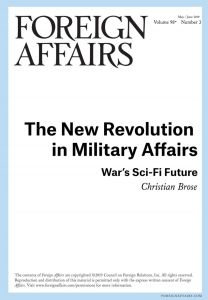Join getAbstract to access the summary!

Join getAbstract to access the summary!
Christian Brose
The New Revolution in Military Affairs
War’s Sci-Fi Future
Foreign Affairs, 2019
What's inside?
Hampered by entrenched interests and a lack of imagination, US policy makers are putting US national security at risk.
Recommendation
Former Staff Director of the US Senate Armed Services Committee Christian Brose is sounding the alarm: The United States is utterly unprepared to fight the wars of tomorrow. In an essay in Foreign Affairs, he explains why even the most sophisticated US stealth bombers won’t be able evade detection for much longer, and why America’s state-of-the-art military systems soon won’t stand a chance against a bevy of cheap, autonomous fighting units. Brose’s sober analysis is a must-read for military and military-industry professionals, as well as US policy makers.
Summary
About the Author
Christian Brose is former Staff Director of the U.S. Senate Armed Services Committee.
















Comment on this summary